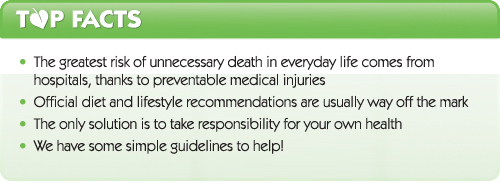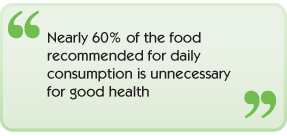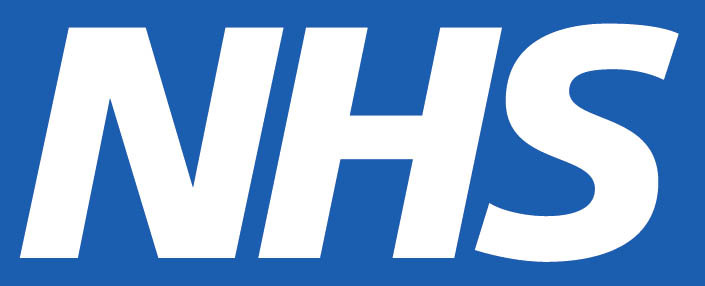UK hospitals are dangerous places to find yourself as an inpatient. At least, that’s what the official figures tell us.

Hospitals: home of preventable medical injuries
In fact, it is in a hospital where we experience our greatest risk of unnecessary death – from what are known as ‘preventable medical injuries’. That doesn’t mean dying of the ailment that brought you to the hospital in the first place; it means dying as a result of a blunder or other preventable problem. That might include the wrong medication, a surgical error or a hospital-borne infection. Official UK statistics reveal that around 330,000 die in this way every year, putting this cause of death roughly on par with that from dying following active service with the British military in the Middle East.
In a presentation given in Sydney, Australia, in 2001, by previous head of Controls Assurance at the Department of Health, it was conceded that around 850,000 medical errors occur in National Health Service (NHS) hospitals each year. These in turn result in 40,000 unnecessary deaths and “other harm”.
Hospital admission is preventable too
Appreciating that once you are admitted to hospital you are exposed to a range of serious risks is one thing. But why are so many admitted to hospital? Among the major reasons are heart disease, cancer, diabetes and obesity, presently the diseases which place the greatest burden on Western healthcare systems. When you factor in that these diseases are regarded by leading health authorities, such as the World Health Organization (WHO), as “largely preventable”, we have to accept that most of our suffering and ill-fate in hospitals is not only unnecessary – but also avoidable.
Who’s to blame?
However you look at it, it’s tough to apportion responsibility or blame for this dire situation. Unsurprisingly, therefore, consensus is rare. Some argue that the state and healthcare professions should educate the population on how to eat healthy diets and live healthy lifestyles that minimise our risk of chronic disease. Others argue that that is the responsibility of the individual. For many people, finding the advice that’s relevant to them is a huge challenge. Still others say it shouldn’t be up to the public to find the answers, and that the information should be readily available from the NHS.
The elusive ‘healthy diet and lifestyle’
Compounding matters further, there is no general agreement on what makes for a healthy diet and lifestyle. Even the basic tenets of what constitutes a healthy diet are the subject of much discussion and disagreement. The US Food Pyramid, for example, has had to be altered several times following new discoveries in the field of nutritional science, and was replaced with the ‘MyPlate’ in 2011. Even the UK’s ‘Eatwell plate’, proposed as public guidance for what constitutes healthy eating by the Department of Health and the NHS, is not accepted as appropriate by many UK nutritional practitioners.
Echoing a commonly held criticism of the Eatwell plate, Meleni Aldridge, a qualified nutritional practitioner and executive coordinator of ANH-Intl, says, “It’s clearly a compromise worked out to appease Big Food interests. Nearly 60% of the food recommended for daily consumption is unnecessary for good health, namely starchy carbs, milk and dairy foods, and drinks high in fat and/or sugar. To the contrary, these foods are centrally involved in the current epidemics of obesity, type 2 diabetes and heart disease. There are large numbers of people who benefit greatly from taking these foods out of their diets and replacing them with vegetables, high quality protein sources and fruits – the kinds of food humans have evolved alongside over millennia.”

Open wide...
It’s a big and bitter pill to swallow if we accept that the advice we’re being given by our governments is a recipe for making us ill in later life. And it’s hardly comforting that we might get unnecessarily harmed or killed if we turn to the healthcare system in an attempt to manage the diseases we contract after a lifetime’s worth of inappropriate eating and lifestyle, But there is no escaping that these are the harsh realities we
Call to action: some simple solutions
So what do we do? Many thousands of us are, of course, doing what we need to do – many of you will be reading this article because you have decided to take responsibility for your own health! And this is, of course, the key. Since factors including our genetic makeup, life circumstances, present levels of health and fitness and availability of time and funds vary greatly between different people, how we take things into our own hands will also vary greatly. But there are some general – and very simple – guidelines:
- Don’t accept blindly what your doctor or your government tells you is best for you
- Eat a varied diet comprised largely of unprocessed foods, including a plentiful supply of vegetables (3–4 portions/day) and fruit (2–3 portions/day), some of which should be raw, and which should be of different colours to ensure adequate phytonutrients are consumed. Remember: eat a rainbow everyday!
- Minimise or eliminate highly processed and refined carbohydrates from your diet, replacing them with vegetables and salads. Minimise or avoid milk and dairy products, particularly if you know you are sensitive to them in larger quantities
- Consume high-quality protein sources and healthy fats, such as fish, lean meats, or vegetarian protein sources containing vegetables like peas, beans or pulses
- Don’t smoke and don’t drink alcohol to excess. Drink 1.5 litres of water daily, or more if you are exercising strenuously
- Be physically active (heart rate raised to at least 55% of its maximum) for at least one hour every day. Resistance training should be included at least 3 times a week.
If your doctor has already given you advice along these lines, then you are among a tiny minority and you’ve almost certainly found yourself a good ‘un! Help those around you to adopt a similar approach, acknowledging in the process that good health is one of the ultimate forms of individual empowerment.








Comments
your voice counts
07 February 2013 at 12:19 pm
I'm a little unclear about the stats above. One figure mentions 330,000 die each year in the UK from preventable medical injuries and another gives 40,000 unnecessary deaths. Can you clarify?
Re the elusive healthy diet and lifestyle, the principle cause of poor nutrition would appear to be the very influential and highly misleading advertising and labelling of food and beverages.
If it's 'fat free', 'sugar free' or 'diet' there is a high probability that it is an unhealthy product. Why is this labelling permitted?
Why is it not compulsory to show the % of every ingredient rather than just of whatever ingredient/s are written on the front of the packet/bottle.
Why are unhealthy foods and beverages (including, of course, alcohol) allowed to be advertised at all? Is there any campaign to stop this?
07 February 2013 at 2:09 pm
Your article on the NHS and its failings raises an awful lot of issues and as far as it goes makes some useful suggestions.
My own personal experience of hospital in the UK is mixed. For all the recent news about falling standards of care, my experience of care during a nephrectomy operation in 1998 was one of kindness and compassion. Sadly, beyond caring, there was very little that they could do for me since four moths later I was told I was terminally ill.
One of the things that struck me very strongly during and after my stay is that many of the staff, from consultants down, are actually terrified of cancer and are unable effectively to offer much beyond platitudes and prescribed treatments that aren’t going to do much good. A real problem arises because so few people in the field of conventional medicine actually have any real conception of what health is. They are wonderful at conducting tests and diagnosing, but they seem blind to the real processes that underlie health and disease, and so have little to offer in terms of effective treatment.
Having worked with people with cancer since that time, teaching cancer control qigong and giving advice and encouragement to people on the things that they can do themselves in order to prevent the outcome they have been told of, I find that people who do take responsibility for their own disease, live much longer and often survive. So many times, people tell me after a checkup they are told by hospital staff, ‘we must have made a mistake.’
A real difficulty exists in getting people to realise that their health is their own responsibility. Sadly, for all the sensible suggestions you make in your article, the fact remains that people who take good care of themselves, and who follow all your recommendations will still fall ill
For disease isn’t merely an issue of getting enough exercise and eating sensibly. So much disease has its origins in the accidents of life. Not merely the physical traumas that afflict us all from time to time, but the emotional ones. So often, a person will remain well until they lose their job, a marriage breaks up, or the house is burgled, and thus begins a sequence of events that lead eventually to serious ill health. In the face of those traumas, advice on frequent exercise or diet seems a little like apple pie and motherhood- good in and of themselves, but in danger of being little more than platitudes.
I have thought long and hard on the issues you raise here. I don’t see allopathic medicine as being equipped to offer much help for almost anyone other than those who need putting together after serious accidents. However, for all the failings and inherent dangers of conventional medicine, too many spokespeople for real alternatives seem intent on carping at every issue and end up preaching to the converted whilst being seen by the general public as cranks.
It is a difficult tightrope to walk, speaking up for the alternatives whilst not coming over as cranks, but I feel the Alliance for Natural Health has learned those skills better than most.
Best wishes,
Kevin Morris
07 February 2013 at 2:31 pm
I agree with most of this, apart perhaps from the suggestion that fat in foods is a contributory factor to obesity. (Incidentally, was the inclusion of fat in a reference to drinks an error?)
Your very-interesting page on which fats are healthy and which are harmful is very interesting. Have you seen the new published paper about omega-6 PUFAs vs saturated fat? It's here:
http://www.bmj.com/highwire/filestream/629053/field_highwire_article_pdf/0/bmj.e8707.full.pdf
I was taken in by the craze for omega-6 oils in the 70s, like so many people. I wonder how many cases of cardiovascular disease, and related conditions such as dementia, have resulted from this, and continue to do so?
21 March 2013 at 1:21 pm
Hi Vivien, ‘Food and drinks high in fat and/or sugar’ is a separate category on the Eatwell plate: http://www.nhs.uk/Livewell/Goodfood/Pages/eatwell-plate.aspx. You might enjoy our recent article on saturated fats, which used the BMJ article as a jumping-off point: http://anhinternational.org/news/saturated-fat-is-not-the-culprit-in-heart-disease.
Your voice counts
We welcome your comments and are very interested in your point of view, but we ask that you keep them relevant to the article, that they be civil and without commercial links. All comments are moderated prior to being published. We reserve the right to edit or not publish comments that we consider abusive or offensive.
There is extra content here from a third party provider. You will be unable to see this content unless you agree to allow Content Cookies. Cookie Preferences